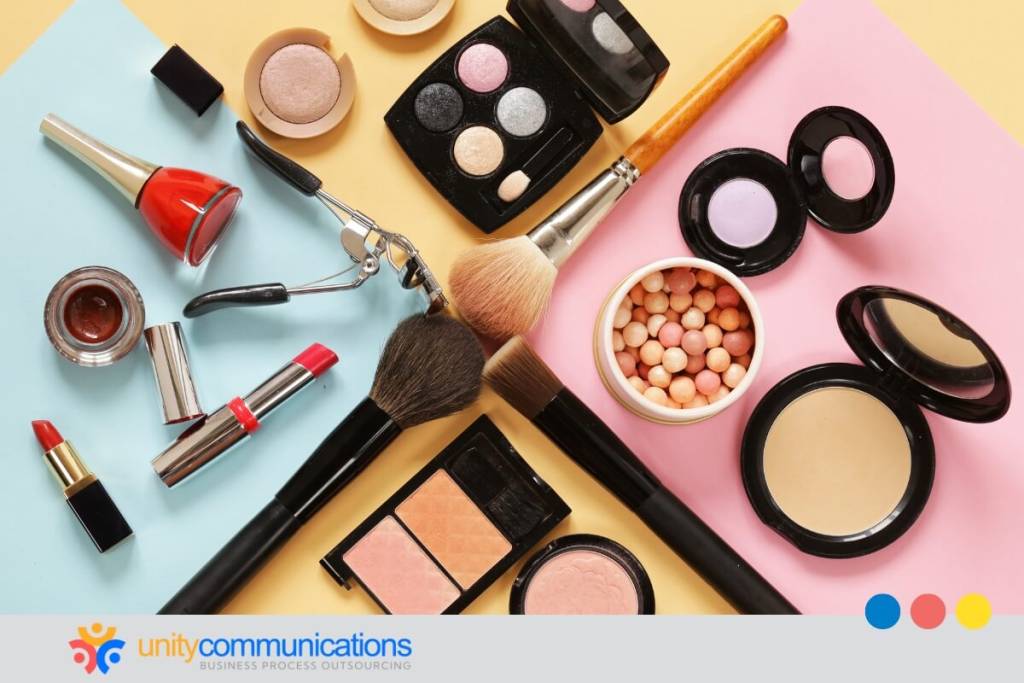IN THIS ARTICLE
Table of Contents
As the concept of beauty constantly changes, the cosmetics industry takes steps to rapidly respond to customer needs. Companies explore new ways and technologies to meet the increasing demand for personal care products and services.
While we know how beauty brands produce best-selling skincare and makeup sets, have you ever considered the role of business process outsourcing (BPO) in this sector? Are you curious how service providers maximize the latest trends to help shape the industry?
If you have, you have found the right page. Here, we discuss BPO’s role in transforming the beauty and cosmetics market.
What Is BPO’s Position in Beauty and Cosmetics?

Bringing increased efficiency and savings is what BPO’s contribution to cosmetics and skincare companies is. Service providers let your brand focus on developing and enhancing beauty products and services by handling the non-core processes listed below:
- Labeling and packaging design
- E-commerce account management
- Product development and formulation
- Manufacturing and production
- Customer support
- Sales and marketing
- Supply chain support
- Market research and analysis
- Regulatory compliance
- Quality assurance
Beauty and Cosmetics Outsourcing Trends to Note

The beauty and cosmetics industry gained $430 billion in revenue in 2022, based on the latest data from McKinsey & Company. The report also showed that younger generations will influence the sector’s expanding range of products, markets, and channels.
For instance, young consumers prefer omnichannel shopping. The firm expects this preference will urge legacy brands to move online and independent labels to adopt a brick-and-mortar setup.
BPO companies consider these factors when supporting personal care businesses. They optimize their workforce’s specialized skills and advanced technologies to help meet changing customer demands.
But before hiring a third-party vendor, ensure you understand the following BPO trends shaping the beauty and cosmetics industry. This way, you can align your budget and strategy with your potential BPO partner.
Private-label Manufacturing Emerges
Many cosmetics and skincare businesses rely on private-label manufacturers to establish branded products while saving operating costs. These third-party companies provide the expertise and infrastructure necessary to produce personal care products.
Service providers comply with strict quality control measures and safety standards to ensure consumers receive reliable and high-quality beauty products. It also increases customer satisfaction and strengthens buyers’ trust.
Because of the continued reliance on outsourcing, data shows the global personal care contract manufacturing market generated revenue of nearly $21.2 billion in 2023. The increasing call for innovative packaging will continue to influence the industry’s expansion.
Here are other benefits that urge enterprises to adopt private-label manufacturing:
- Customize products per specific brand requirements and target customers.
- Launch new beauty and cosmetics brands rapidly.
- Diversify product offerings without worrying about in-house production limitations.
- Adjust production volumes based on market demands and unexpected issues.
- Quickly address potential risks impacting daily production.
Customer Experiences Become More Personalized
Consumers value a personalized customer experience when purchasing personal care products and services. In its 2021 study, Nosto found that 63% of polled buyers remain loyal to brands that remember their shopping choices and customize online support accordingly.
Service providers take note of such demands to enhance your company’s competitive edge. BPO call centers specializing in beauty and cosmetics personalize customer support. They use advanced data analytics tools and strategies to create tailored consumer interactions. Here’s how:
- Use an omnichannel platform for seamless customer engagement. This integrated solution allows customers to seek assistance through their preferred communication channels. It ensures buyers receive consistent and personalized support.
- Harness customer data from various touchpoints, such as social media. Providers use these valuable insights to understand consumer preferences and purchasing patterns. Such information helps enable targeted promotions.
- Provide personalized product recommendations. BPO companies optimize relevant data to suggest beauty and cosmetics products based on customers’ purchases, browsing history, and preferences.
- Perform outreach initiatives, such as follow-up calls and personalized emails. This proactive measure shows commitment to understanding and meeting customers’ individual needs.
- Conduct feedback collection and analysis. Third-party contact centers actively seek customer input to identify areas for improvement. They use the results to make necessary adjustments and execute projects to enhance the customer experience.
Artificial Intelligence (AI) Usage Continues
Support vendors continue using AI as a critical tool for personalized customer service. In the same study, Nosto stated that 45% of consumers choose brands that let them try personal care products using AI or virtual reality (VR) technology. Another 58% favor an online quiz-like experience to recommend the best items that fit their needs.
Beauty corporations such as Ulta Beauty, Schwan Cosmetics, Living Proof, and Murad maximize the advantage. They have acquired a digital personal care platform from a global services provider to deliver true-to-life try-on opportunities for skincare and makeup products.
BPO companies use AI-powered image recognition to let customers try makeup and skincare products virtually. These try-on tools can match a consumer’s facial features and skin tones with personal care items, helping buyers make informed purchase decisions.
Apart from that benefit, here are other ways BPO providers apply AI in beauty and cosmetics:
- Use chatbots and virtual assistants to provide faster and more effective buyer support.
- Automate data collection and analysis for customer-centric item recommendations.
- Forecast upcoming beauty and cosmetics trends.
- Streamline customer feedback and sentiment analysis.
- Harness data analytics tools to personalize website, email, and social media marketing.
- Speed up data entry and inventory management.
- Personalize online product advertisements based on clickstreams and buying patterns.
- Automate product labeling and packaging services.
- Simplify product formula calculations.
The Bottom Line

Outsourcing is vital to helping personal care businesses meet the evolving demand for beauty and cosmetic products. BPO companies offer affordable access to readily available human and tech resources.
Service providers adapt to the latest trends that transform the beauty sector to ensure superior outcomes. They maximize private-label manufacturing and personalized customer service techniques to enhance daily processes. AI adoption further revolutionizes how they help brands deliver a superb consumer experience.
Let’s connect if you want to learn more about how a BPO organization supports your beauty brand. Unity Communications houses highly skilled call center agents and advanced tools to respond to your consumers’ growing needs for personal care products and services.





